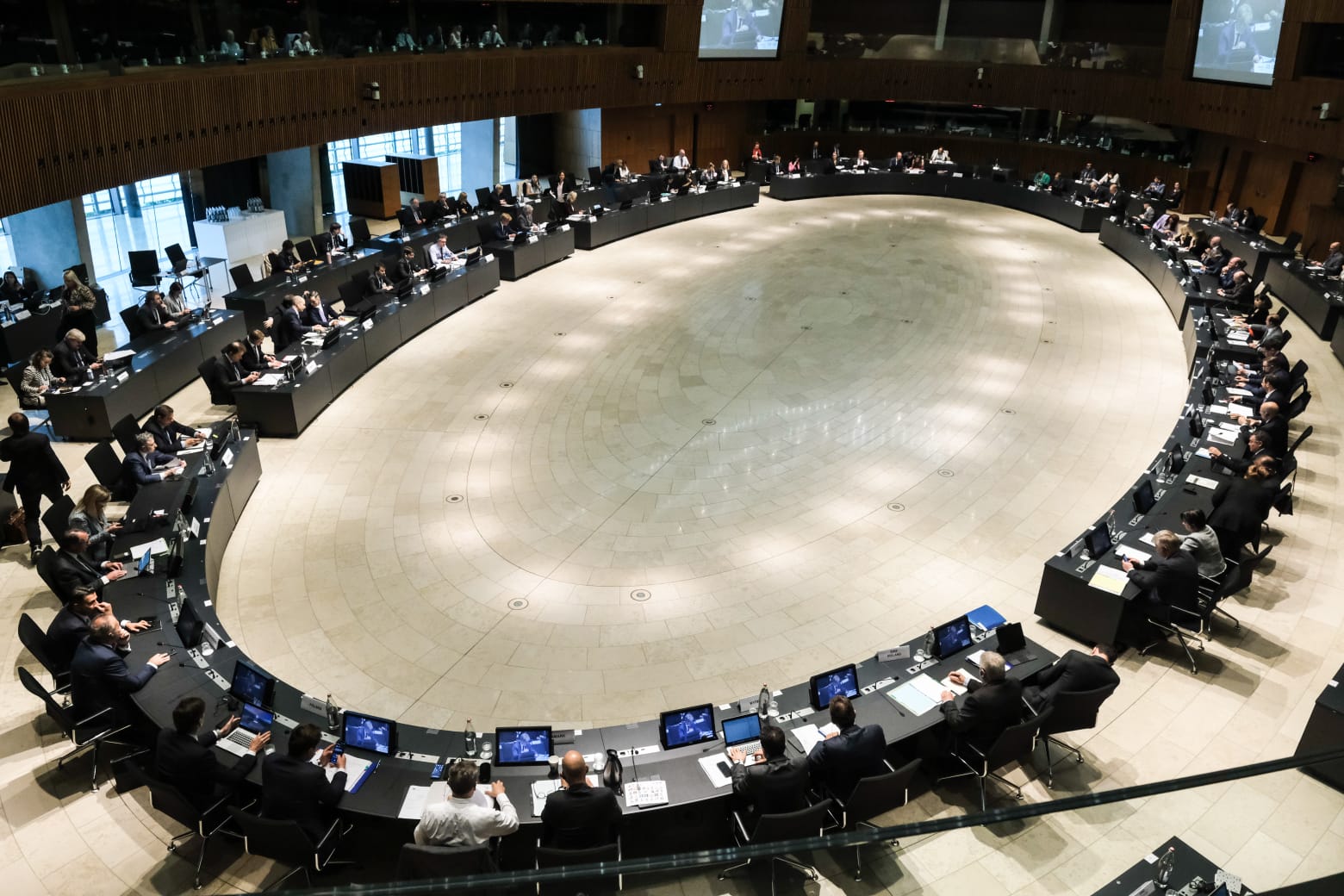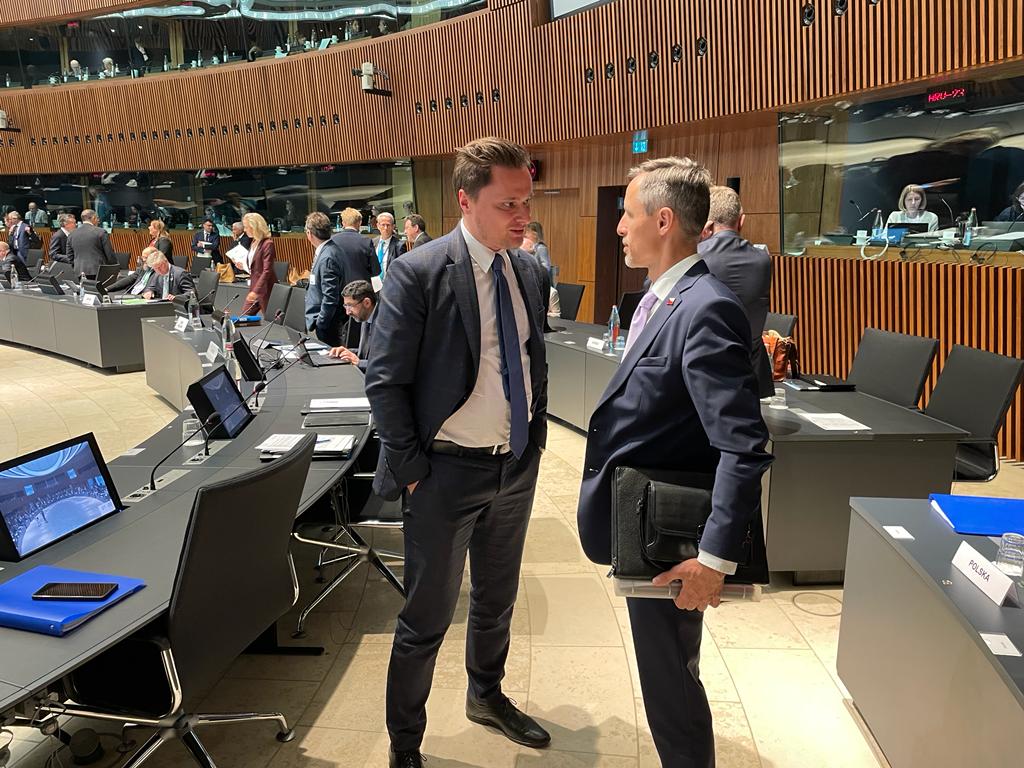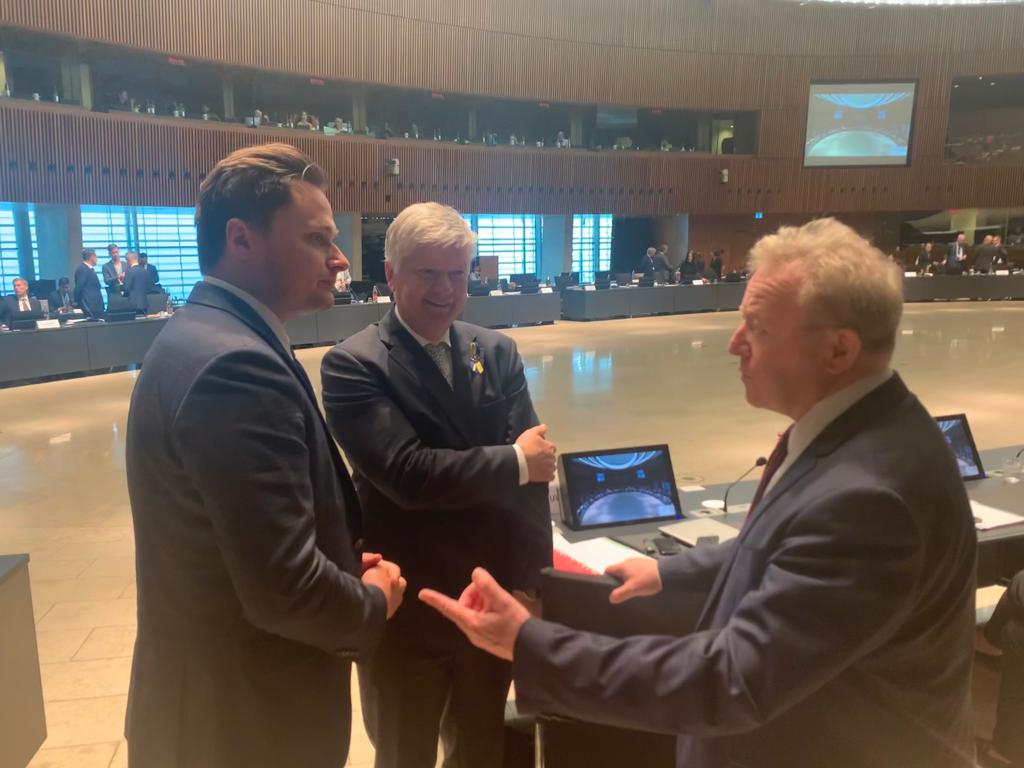Issues of importance for fisheries and agriculture at AGRIFISH in Luxembourg
13.06.2022
Undersecretary of State Krzysztof Ciecióra participated in the meeting of the Agriculture and Fisheries Council (AGRIFISH) in Luxembourg. Its most important topics included: the implementation of the Common Fisheries Policy and consultations on the fishing limits for 2023, the situation on the agricultural markets, the application of the EU standards to imported agri-food products, the sustainable use of plant protection products and ASF.

The state of European fisheries
Under the item of the agenda concerned with fisheries, the European Commission (EC) presented the main assumptions of the Communication “Towards more sustainable fishing in the EU: state of play and orientations for 2023”, indicating positive trends in the context of the recovery of stocks in European waters. In addition, the EC stressed the need for further efforts to mitigate the economic and social impacts on the sector caused by the COVID-19 pandemic and the Russian military aggression against Ukraine.
The delegations expressed their general support for the EC, raising the issues of actions for sustainable fishing activities in line with scientific advice, and also noted the need for considering the current geopolitical situation in the further legislative work. In this context, a joint statement of Poland, Lithuania, Latvia, Estonia, Sweden, Finland, Germany and Denmark, indicating an adverse impact of the operations carried out by Russia in the Baltic Sea, was supported by a majority.
Presenting Poland’s position, Deputy Minister Krzysztof Ciecióra stressed that further actions were needed to improve the condition of fish stocks.
“However, these actions must not be based only on reductions of fishing quotas. There is a need for a holistic approach which will help change the adverse environmental situation in the Baltic Sea. Representatives of science need to become involved to a greater extent and work on selective fishing tools must be undertaken,” Undersecretary of State Krzysztof Ciecióra said.
The situation on the agricultural markets
Under the item of the agenda concerned with the situation on the agricultural markets, especially following the Russian invasion of Ukraine, the Ministers heard information from the EC that the issue of global food security remained a priority issue. Russia’s actions pose a threat not only directly to Ukraine, but also to millions of persons in all the continents, causing an increase in food prices and difficulties with food availability.
Referring to the situation on the agricultural markets, the EC pointed out the impact of unfavourable weather on the expected slight reduction in cereal harvests. The EC also noted the lesser export opportunities in the wine sector and in the fruit and vegetables sector, as well as the persistent high production costs and growing food prices.
During the discussion the delegations appreciated the actions which had already been taken by the EC, including its recent proposal for flexibility in the use of the EAFRD resources. The Member States pointed further problems resulting from persistent high production costs. A dozen or so Member States, including Poland, supported a derogation in 2023 from the obligation to meet certain conditionality requirements, i.e. the GAEC 7 and/or GAEC 8 standards, in order to enhance the production capacities in the EU.
On this issue, the EC declared that work would be intensified to translate these motions into a legislative proposal. Many Member States called on the EC to urgently approve CAP Strategic Plans.
Deputy Minister Krzysztof Ciecióra stated that the war in Ukraine continued to contribute to a strong increase in the prices of both production inputs and agricultural products. He informed about the actions implemented and planned by Poland, including, among others, the exceptional adjustment aid for dessert apple and pig producers, as well as the implementation of enhanced advance payments towards direct and area payments.
At the same time, the Undersecretary of State informed that Poland noted with concern that as from 12 May 2020 Ukraine deleted, among others, milk, cream, butter, other milk fats, yoghurt, as well as pastas, from the list of critical import goods.
“In practice, this means that Ukrainian entrepreneurs have become unable to buy most of Polish dairy products,” Deputy Minister Krzysztof Ciecióra said.
The application of the EU standards to imports from third countries
Under another item of the agenda, the EC presented a report on the application of EU health and environmental standards to imported agricultural and agri-food products. The EC also stressed the importance of the transformation of global food systems towards greater sustainability, particularly in the present situation in the world.
During the discussion, the Member States positively received the EC report. Most of the delegations were of the opinion that efforts should be taken to enhance the sustainability of food systems, stressing the role of the EU in promoting this goal in the world. The Ministers agreed that the WHO rules needed to respected when the requirements for imported products were adopted.
It follows from the EC report that it is possible to take action in line with this framework. Referring to the priority areas where the scope of standards required for imports needs to be expanded, the Member States indicated, among others, health, animal welfare, plant protection products, antibiotic resistance and environmental standards.
In Poland’s opinion, compliance of imported products with the EU health standards should still continue to be a priority. International obligations enable the full enforcement of the EU food safety standards. The expansion of the scope of the standards required for imports should focus on such areas as animal welfare and residues of plants protection products.
“As regards the instruments for achieving the objectives referred to in the report, the opportunities provided by free trade agreements should be actively used,” Deputy Minister Krzysztof Ciecióra said.
The sustainable use of plant protection products
Under the other business item of the agenda, a discussion was also held on the joint document of Austria, Belgium, Bulgaria, Estonia, Hungary, Lithuania, Latvia, Poland, Romania Slovakia and Slovenia concerning a common approach to the reduction targets in the future legal act regarding the sustainable use of plant protection products.
The Member States expressed their concerns in relation to the unofficially released proposal for a legislative act regarding the sustainable use of plant protection products. They objected to the imposition of a mandatory 50% reduction policy target at the national level, which the EC had previously included in the Farm to Fork Strategy. They expressed their concerns that the EU production might lose its competiveness and that the crisis caused by the war in Ukraine become worse.
Presenting Poland’s position, Deputy Minister Krzysztof Ciecióra stressed that any actions to reduce the use of plant protection products should be based on solid scientific grounds and take into account the crop protection needs of particular Member States. Account should also be taken of the differences among the Member States in terms of the quantities of active substances used per hectare of farmland.
“Indeed, taking care of the environment we cannot forget that the basic function of agriculture is to safeguard food security. This is becoming especially topical in the context of the threats to the global food system resulting from the war in Ukraine. The legal solutions adopted in the European Union should not lead to a limitation of agricultural production and greater dependence on food imports,” the Undersecretary of State stressed.
ASF
The EC also addressed the theses put forth in the document “African swine fever: The state of play and further measures” which it had prepared. In the course of the discussion, the Member States admitted that the disease should be treated as a priority and that joint coordinated measures should be taken to contain its spread.
The Member States agreed that work should be continued to develop an effective and safe vaccine against ASF. They stressed the need to engage in a further dialogue with the stakeholders: the sector and hunters, as well as third countries, in the scope of recognising the European regionalisation policy.
In Poland’s opinion, bearing in main the threat and consequences of an outbreak of African swine fever, any measures should be taken to contain the spread of this serious disease. A particular emphasis should be placed on the correct management of the wild boar population and the issues of broadly conceived biosecurity.



